Navigating Media Power and Political Influence in 2024
From AI Ads to Far-Right Narratives: Examining Media's Role in Shaping Democracy and Voter Perceptions
Media Coverage of the 2024 U.S. Presidential Election
On Thursday, October 24th, the UNC Center for Information, Technology, and Public Life hosted "Media Coverage of the 2024 U.S. Presidential Election: The View from Germany and the United States," in partnership with UNC Global Affairs, Thomas Mann House Los Angeles, and the UNC Center for European Studies, and co-sponsored by the UNC School of Information and Library Science.
The fireside chat featured Dr. Tressie McMillan Cottom, a New York Times columnist, Principal Investigator at CITAP, and Professor at the UNC School of Information and Library Science, alongside Juliane Schäuble, U.S. Correspondent for the German Tagesspiegel newspaper. The conversation was moderated by Daniel Kreiss, Principal Investigator at CITAP and Professor at the UNC Hussman School of Journalism and Media.
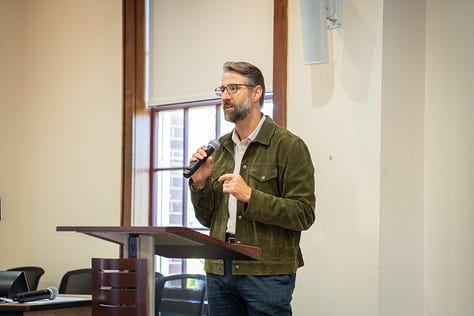
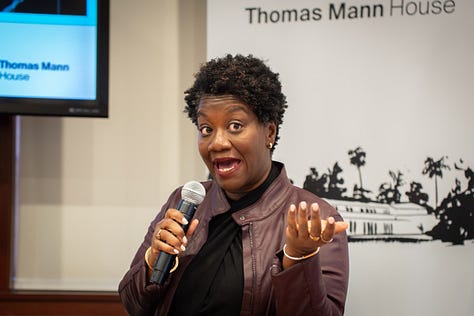
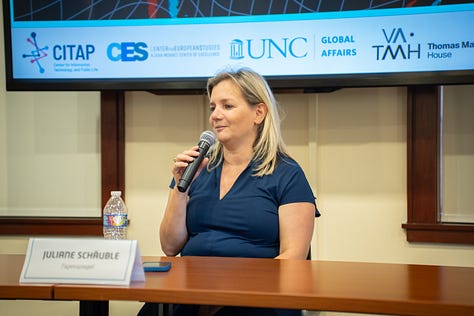
The event provided a unique opportunity to explore media dynamics in the 2024 U.S. presidential election from both German and American perspectives. Attendees gained insights into the role of media in shaping public opinion and its implications for democracy in a global context. Juliane emphasized, “It’s so much about the persona—it’s about how somebody is on stage rather than the actual issues.” Juliane also noted that because so much is about the persona of Trump and issues that are over-covered, there are pivotal issues that are missed: “We are missing crucial topics in this election debate—foreign policy, climate change, all left out of the conversation… it doesn’t fit in maybe a 30-second glitz and headline.” Tressie added, “Donald Trump has played the incentives and fears of the media environment like a fiddle. Even when we know it, we can’t stop dancing to his tune.”
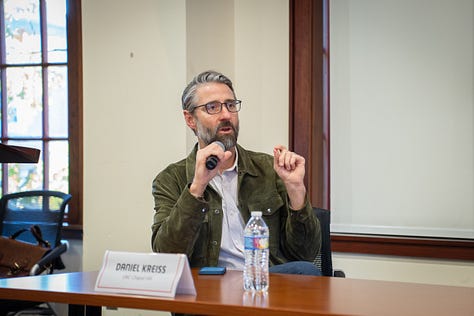
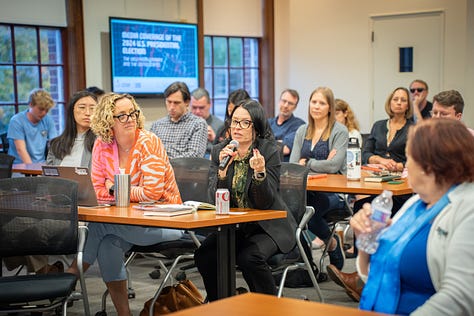

The discussion also touched on economic coverage, with Tressie urging a shift toward materialist perspectives that connect economic realities to voter behavior. She noted that economic anxieties are often misrepresented as simple inflation concerns, rather than part of broader social issues. Tressie highlighted the intersection of economic realities and feminist theory, arguing for a broader understanding of economic issues in media coverage. She noted that discussions about inflation often fail to capture the full impact of economic pressures on everyday life, particularly for women, saying “Inflation has become a stylized fact—an easy explanation that often misses the deeper issue of economic struggle, like the high cost of care and the erosion of the social safety net.”
She emphasized that many economic anxieties are rooted in the challenges of managing childcare, elder care, and the overall cost of work, pointing out that these issues are fundamentally linked to gender dynamics in society. Tressie argued that the lack of support systems disproportionately affects women and impacts voter behavior. She called for media coverage that addresses these economic realities more directly, offering a more comprehensive analysis that goes beyond the superficial narratives often found in campaign reporting.
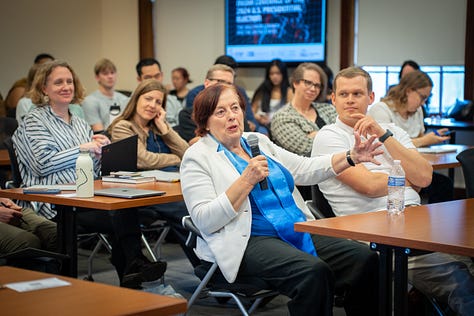


The fireside chat concluded with an engaging Q&A session from the audience exploring media ethics, campaign effectiveness, and coverage gaps in the 2024 election. Attendees raised concerns about media's focus on poll-driven narratives, challenges in balancing critical reporting with objectivity, and the need for deeper coverage of economic and class issues. Tressie and Juliane emphasized that while campaigns can impact turnout, structural factors still favor certain candidates. They called for more nuanced reporting, particularly on underrepresented topics like climate change, economic struggles, and the roles of race and gender in voter decision-making.
Musk’s Influence on Political Discourse
Daniel Kreiss spoke with Sean Burch of The Wrap, where he highlighted Elon Musk's active support for Donald Trump as "unprecedented" for a media owner. Musk’s use of his X platform to promote a partisan agenda is unlike anything seen before in media ownership, Kreiss observed.
While Kreiss noted that Musk’s behavior is legal, similar to that of traditional partisan media outlets, he underscored an ethical concern: platforms like X should be transparent about their algorithmic and content moderation decisions. “The ethical issue comes in if you’re not disclosing ways you’re actively involved in making content moderation decisions that favor one candidate over another,” Kreiss explained. He emphasized that users deserve clear disclosure about how platforms shape their content to ensure informed engagement with digital media.
Deen Freelon commented on the impact of Elon Musk's misinformation on X during the 2024 election to Madison Czopek of PolitiFact. Freelon emphasized Musk’s extensive reach as both X’s most-followed user and the world’s richest man, stating that his influence is amplified by fans who trust and admire him. “Fans trust and adore their idols and with that trust and adoration, those idols can shape fans’ beliefs and perceptions."
Freelon explained that Musk’s status as a perceived “truth-teller of ‘forbidden narratives’” within far-right circles extends the reach of the misinformation he spreads, making it more likely for his followers to accept and further share false claims. This dynamic creates significant challenges, as Musk’s posts can impact not only online discourse but also offline responses, forcing government officials and other authorities to react.
Publications and Appearances
In “Political Communication Research is Unprepared for the Far Right”, authors Curd Knüpfer, Sarah J. Jackson, and Daniel Kreiss argue that the field of political communication is ill-prepared to address the rise of far-right movements, describing it as “fundamentally shaped by and within post-World War Two Western liberal democratic systems.” Existing frameworks struggle to tackle the “self-reflexive” and often deceptive tactics of contemporary far-right actors, who “appropriate the liberal norms and practices they seek to undermine.”
The authors emphasize the urgent need for “democratic clarity,” urging scholars to take a definitive stance in defense of democratic principles. They argue that “political communication must take a stand” against the anti-democratic tactics of the far right, which uses liberal norms like free speech to advance illiberal agendas. The authors critique the field's tendency to label far-right actors with terms like “alternative” or “populist,” noting that such euphemisms “do the bidding of these ideological actors” by legitimizing their positions.
Knüpfer, Jackson, and Kreiss call for political communication scholars to adopt new frameworks that accurately categorize and counter these actors. They stress that the field must move beyond an “idealized era” of democracy, acknowledging its failures to fully include marginalized groups. By embracing more rigorous concepts and rooted normative positions, the authors aim to better equip scholars to understand and defend against the far-right's anti-democratic strategies.
In her most recent New York Times column, Tressie McMillan Cottom argues that Donald Trump’s rallies, once a “dopamine hit factory” for the MAGA base, are losing their appeal. She describes Trump’s recent Madison Square Garden event as a desperate attempt to reignite excitement, featuring cruder humor from surrogates like Tony Hinchcliffe, who mocked Puerto Ricans, and Tucker Carlson, who delivered eugenics-themed jokes about Kamala Harris. Cottom calls the event a “dopamine jamboree for the MAGA faithful” as Trump sought to recapture the transgressive thrill that fueled his earlier rallies.
Cottom contends that the 2024 election is not only about selecting a president but also about defining the boundaries of political transgression in the years to come. She warns that “MAGA truly has nowhere left to go but down,” emphasizing that this shift has broader implications for U.S. politics, from gerrymandering and big-money influence to the tone of future campaigns.
Francesca Tripodi appeared on a Rutgers Digital Ethnography Working Group discussion called “DEWG: Election Edition!" Francesca spoke of her experience using Wikipedia data to research editors who wanted to close gender gaps on the website and how ethnographic observations and questions guided the data analysis. Francesca also highlighted the work of Shannon McGregor and Meredith Clark to reference the use of artificial intelligence in memetic culture. She explained that the cat and dog memes circulating after the presidential debate furthered a certain racialized agenda.
Shannon McGregor spoke with Defne Önal of The Daily Tar Heel about the potential impact of AI in political advertising, emphasizing that the unknown extent of its use could increase public fear. While most political ads tend to influence voter turnout and fundraising rather than changing voter preferences, McGregor noted that generative AI could be particularly influential in smaller, down-ballot races where there is less information and familiarity with candidates.
She expressed concern over the ease of access to AI tools, which makes them more likely to be used in local campaigns. McGregor called for transparency in political ads that use generative AI content, highlighting the importance of clear labeling as the public becomes more accustomed to AI in communication.
Affiliate Highlights
Former CITAP postdoc and current affiliate, Yiping Xia, has a book chapter coming in the volume, “Digital Media Metaphors: A Critical Introduction” (Routledge). Yiping’s chapter with Johan Farkas, a volume editor, is titled “Troll: The Problem with Digital Tricksters and Monsters”:
In this chapter, we analyze the origins and uses of the troll metaphor and – building on existing research – present a critique of its potential role in downplaying the severity of racism, misogyny, and state-orchestrated propaganda. The metaphors of ‘troll’ and ‘trolling,’ we argue, have become oversaturated with phantasmatic meaning due to their invocation of longstanding mythologies about tricksters and monsters. In this way, these terms contribute with little clarity, while adding a sense of more-than-human agency to social transgression online. Taken together, the chapter provides both an introduction to the etymology of the ‘troll’ metaphor as well as a critical discussion of its limitations in connection to threats to democratic debate.
A Wall Street Journal article examines the complex role social media plays in youth mental health, emphasizing that its impact is still unclear. Researchers note that mental health is influenced by many factors, making it challenging to determine how much social media contributes to recent mental health trends among young people.
Alice Marwick, director of research at Data & Society, highlighted that social media can have positive effects, particularly by allowing young people to make vital connections beyond their immediate surroundings. Marwick explained, “Young people benefit from digital tools and making vital connections outside their ZIP Code.” This perspective underscores the nuanced role of digital platforms, which can offer significant social benefits while also posing risks like disrupted sleep and attention.




